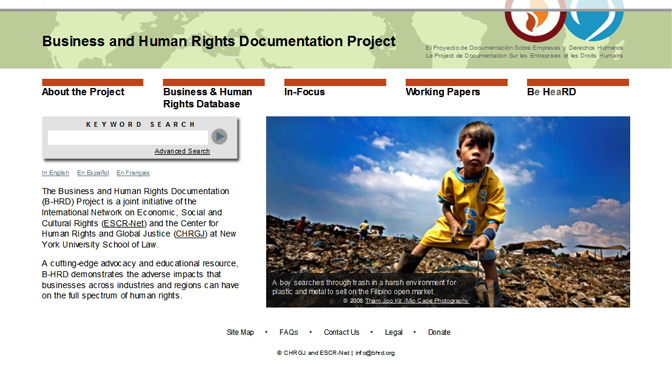CORPORATE ACCOUNTABILITY - April 2011

UN Advocacy on Business and Human Rights
In its ongoing advocacy for corporate accountability, ESCR-Net's Corporate Accountability Working Group continues to engage with UN processes related to business and human rights, especially within the mandate of the Special Representative of the Secretary General (SRSG) on Business and Human Rights, Professor John Ruggie. In October, 2010, ESCR-Net and several members of its Corporate Accountability Working Group participated in a civil society consultation on the SRSG's Guiding Principles to advocate for key issues to be included in the Guiding Principles for implementation of the SRSG's "Protect, Respect and Remedy" framework.
Once the first draft of the Guiding Principles was released later in 2010, ESCR-Net co-facilitated a joint civil society statement on the draft Guiding Principles which identifies critical areas in the current draft that need revision or further elaboration if the document is to become a useful tool to prevent and redress business-related abuses of human rights. This statement was later endorsed by over 100 of the world's premier corporate accountability organizations. It was then featured in a Financial Times article, followed up by a lively set of letters to the editor in response. In addition to this statement, ESCR-Net also supported together with several members of the ETO Consortium a submission to strengthen the extraterritorial implications of the duty of governments to protect human rights: "States' obligations to respect and protect human rights abroad: Joint Statement on John Ruggie's Draft Guiding Principles." If you are interested in reading all the submissions to the draft Guiding Principles presented by other organizations, visit the Business and Human Rights Resource Centre.
As the SRSG mandate comes to a close in June 2011, ESCR-Net's Corporate Accountability Working Group and its partners will continue to constructively advocate for strengthened international mechanisms and standards to close the existing gaps in protection and prevention of business-related human rights abuses.
GET INVOLVED!
For more information or to find out how you can get involved in this campaign, write to Niko Lusiani at nlusiani@escr-net.org.
The Business and Human Rights Documentation (B-HRD) Project

ESCR-Net and the Center for Human Rights and Global Justice (CHRGJ) at New York University School of Law are making considerable technical and substantive progress in the Business and Human Rights Documentation (B-HRD) Project. B-HRD will provide grassroots groups, NGOs, policymakers, experts, advocates, academics, and the public at large an interactive web portal about the human rights impacts of business activities and much-needed advocacy tools to hold businesses accountable in a globalized world. On October 11, 2010, BHRD co-founders organized a public forum called Corporate Accountability at the Crossroads: Human Rights Tools and Tactics to Help Hold Businesses Accountable, which gave a voice to those whose human rights are affected by business while at the same time allowing participants to preview the new B-HRD site, and provide helpful feedback. These insights are now being incorporated into the site, which we expect to launch with several new improvements later in 2011.
GET INVOLVED!
For more information, write to Niko Lusiani at nlusiani@escr-net.org.
Corporate Accountability in the United States Universal Periodic Review
ESCR-Net along with a number of other US-based human rights organizations were involved in the UN Human Rights Council's first Universal Periodic Review (UPR) of the USA, which took place on November 5, 2010. This process offered organizations an important opportunity to both measure how the U.S. is meeting its human rights obligations and to continue pressuring the government to live up to those obligations at home and abroad.
As part of our campaign to hold companies accountable to human rights, the Center for Constitutional Rights, EarthRights International, the Western Shoshone Defense Project and ESCR-Net's Corporate Accountability Working Group presented a submission to the Human Rights Council on the US UPR process in April, 2010 analyzing the U.S. government's record on business and human rights. The submission examines the degree to which the U.S. is upholding its duties to respect, protect and remedy human rights abuses involving business actors acting abroad and on or near indigenous lands in the United States. The submission acknowledges that while the U.S. has taken some noteworthy legislative, adjudicative, administrative and policy measures to address business-related abuses, its overall approach has been at best piecemeal and incoherent. The submission then draws out a series of inter-related recommendations for the U.S. government, which if implemented would represent valuable steps towards preventing and protecting against business-related abuses worldwide. The full submission can be found here. The Center for Constitutional Rights, EarthRights International, the Western Shoshone Defense Project, the International Federation for Human Rights (FIDH), the International Commission of Jurists and ESCR-Net also organized a panel discussion, Corporate Accountability in the Obama Era, to raise awareness among Human Rights Council members about the spotty corporate accountability record of the US. Groups affected by human rights abuses were given the chance to discuss their struggles and challenges when dealing with the government's efforts to remedy abuses.
Largely as a result of these advocacy efforts, the Indian ambassador to the United Nations highlighted the problem of corporate human rights abuses in the US, questioning the US. delegation on the government's position on the Alien Tort Statute, as well as the recent decision in Kiobel v. Shell.
